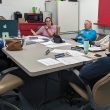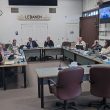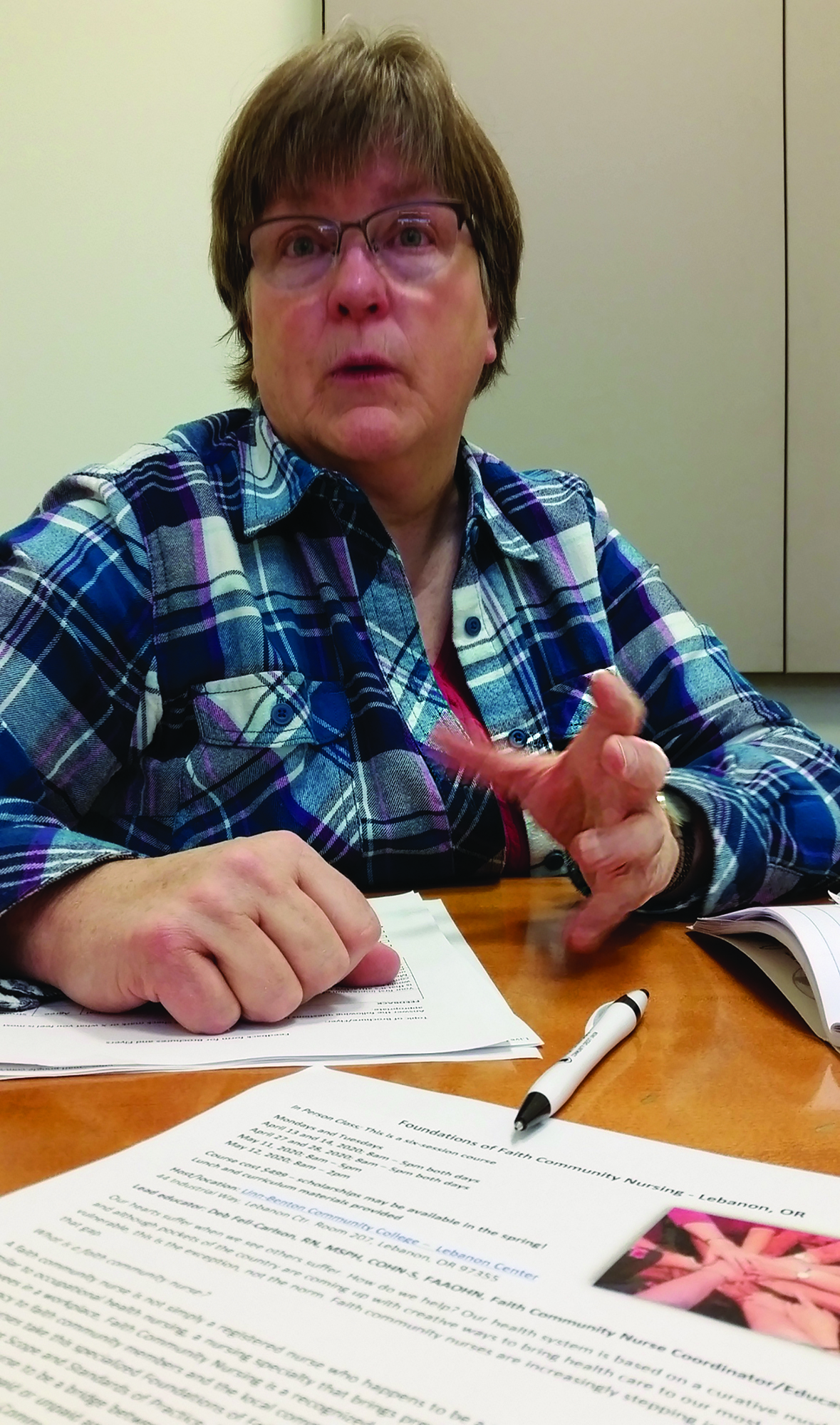By Sarah Brown
Lebanon Local
Calling all nurses whose heartbeat is for the whole health of their community.
Deb Fell-Carlson, coordinator for a course called “Foundations of Faith Community Nursing” through Linn-Benton Community College, hopes to attract a group of individuals who would be interested in building a network of local faith community nurses.
The focus is similar to occupational health nurses, Fell-Carlson explained.
“Instead of (dealing with work-related) hazards, we have spiritual care, health promotion activities, questions, navigation, and going to see people that are shut in or who are recovering from a long illness at home. It’s sort of another healthcare point of access for people out in the faith communities to bring healthcare to them, instead of making everyone come to healthcare,” she said.
The faith community nurse movement began from the work of Granger Westberg, a Lutheran clergyman who believed health is a wholistic issue that includes not only physical care, but also spiritual and community-centered care.
“It’s a wholistic assessment,” Fell-Carlson said. “When you are assessing someone and you’re having a conversation with them, you’re assessing their spiritual health, their emotional health, their mental health, their intellectual capabilities, their physical capabilities; all of that gets assessed at the same time.”
In nursing school, students receive a lot of training on physical, emotional, and mental health, but very little on spiritual care, Fell-Carlson said.
“There has to be some sort of spiritual care assessment, and the research shows unequivocally that all of us – nurses, doctors, all of us – know that that needs to happen, and that spiritual care needs to be provided, but most of us are not comfortable giving it.”
Some individuals might be put off by the term “faith,” noted Marcy Shanks, a nursing professor at Linn-Benton Community College. Faith community nurses are not associated with proselytizing, but, rather, with assisting individuals regarding health concerns and issues.
It can be a broad topic, but in general, a faith community nurse can be connected to a church or any sort of community group. They make themselves available to promote health and provide assistance to those members. A nurse who works in a hospital might also be trained as a faith community nurse, and can serve his or her community in a wholistic manner.
“Typically, faith-based nurses are those associated with faith organizations, and these organizations often seek to meet the physical needs of those in our communities,” Shanks said. “These nurses may be paid by the congregations or hospitals – sometimes a combination of both – or may be completely volunteer. Faith based nurses can provide support for spiritual needs if the patient has such needs or concerns, and serves as a member of the pastoral staff of the church.”
Regardless, these specially-trained nurses act as a resource to promote health, provide spiritual support and companionship, and connect people to resources and the healthcare community.
They could be useful at a warming shelter, as a fire corps volunteer, or simply as a concerned neighbor or member of a spiritual community. Fell-Carlson is also considering how these nurses can play a role in reducing unnecessary emergency response calls, and how they can help at warming shelters.
“I haven’t been a faith community nurse that long, but I see the value in it,” Fell-Carlson said. “I see how if we can build it into the fabric of what we’re doing as a community for community health, it will be self-sustaining.”
Shanks is convinced faith community nurses are needed.
“Nurses are an essential part of our community’s health and welfare,” she said. “In a community such as ours, a plethora of physical, emotional, mental health needs exists. Additionally, other issues impact health care in Lebanon, including generational poverty, unemployment, or jobs that do not financially support self sufficiency, housing needs, transportation issues, crime, addiction; the list is endless.”
Nurses can help with that, she said. If every faith-based organization had a faith community nurse educating about basic health issues, such as good hygiene and cleanliness, they could decrease hospital re-admissions, Shanks said.
The six-session course provides knowledge and skills to help equip the nurse to be a bridge between the healthcare system and faith community, she said. Topics include, but are not limited to: assessing the whole person, addressing spiritual care needs, understanding legal and ethical issues, dealing with grief, recognizing abuse, and accessing resources.
Those who should consider taking the course are nurses interested in spiritual care, community health, or community service, and nurses who are part of a spiritual community, Fell-Carlson said. It may also be suitable for social service providers, caregivers, fire department volunteers, allied health professionals, and the council of governments.
Under the umbrella of Live Longer Lebanon, Fell-Carlson also coordinates the Mid-Willamette Valley Faith Community Nurses and Health Ministers Network.
The course costs $499 and will start in April. Fell-Carlson believes the course at LBCC is the only one in Oregon outside of Portland.




